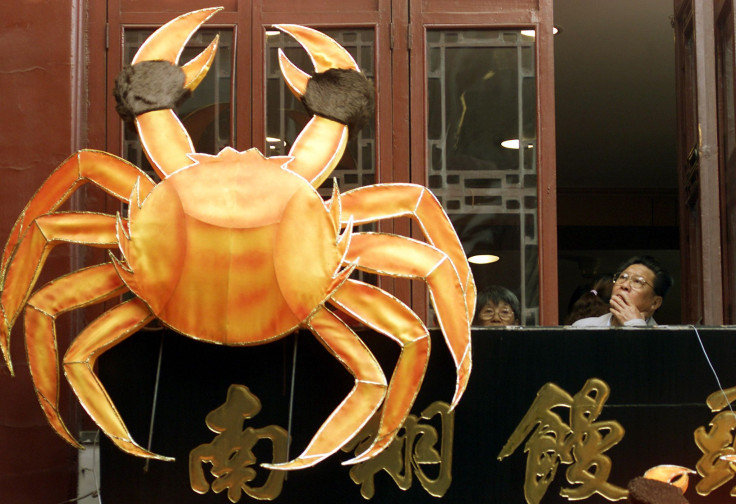China's Austerity Measures Cause 40% Fall In High-End Crab Sales

After luxury goods, mooncakes and high-end restaurants, so-called "hairy" crabs have become the latest industry to fall to China’s austerity plan.
Free hairy crabs should be flying off the shelf onto elaborate banquet tables for government officials this time of year in eastern China, but this year, these hairy-limbed delicacies are not moving at all, thanks to President Xi Jinping’s anti-corruption measures, the Financial Times reported Sunday.
“In previous years, 40 percent of our sales were from government consumption but this year that 40 percent is completely gone,” said Ling Zhiping, owner of Ling’s Crab House near Yangcheng Lake near Shanghai, home to some of China’s most famous crustacean restaurants. In 18 years of crabbing, he says he has never seen things this bad.
Xi’s austerity plan, first enacted at the end of the last year, has already hit sales for high-end restaurants, luxury brands, mooncakes and grain spirits, and things are not likely to get better, as China’s leadership reiterated its resolve to crack down on corruption at the recent Third Plenum meeting.
Officials do not dare to stage costly crab feasts on the government tab under the crackdown, and big companies are struggling to get bureaucrats to accept crab gift packs, which has been a common way of getting on the officials’ good side, until this year.
Many crab restaurants have seen sales hit by half or more, said Rong Wei, director of the Kunshan Bacheng Yangcheng Area Crab Industrial Association, but Rong hopes that non-government consumers can eventually pick up the slack as the area’s middle class is growing.
“Crabs should be something that ordinary people can afford and the austerity ban will bring the market back to normal,” Rong added, according to the Financial Times.
To cope with falling local sales, crab house owners are repositioning their restaurants to prosper in the new environment.
“I am flying to other cities promoting our crabs to hotels,” said the owner of the Old Friend Crab Restaurant, a man who wished to be called Boss Li. “They require small to mid-sized crabs – not high-end crabs – because they sell to the mass market.”
The widely known corruption scandal involving British Pharmaceutical company, GlaxoSmithKline, also affected crab sales. Some local travel agencies were accused of helping GSK launder bribes to doctors, and were closed down, decreasing the number of crab-eating day tours these travel agents offered, the Financial Times reported.
© Copyright IBTimes 2024. All rights reserved.











